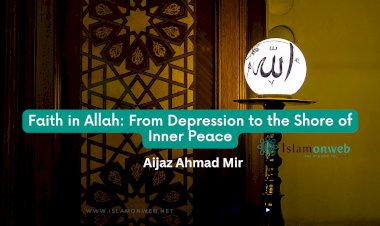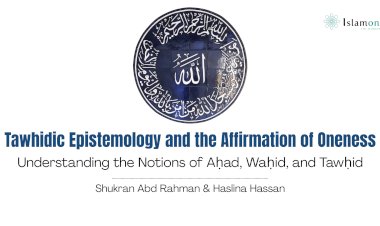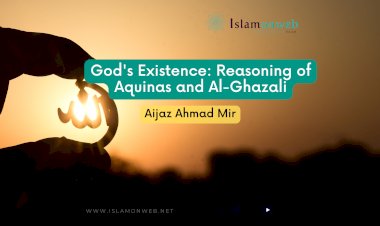Faith, Fitrah and Temporality
Islam forms an integral part of man's essential nature (Fitrah) as is explicitly mentioned by the Qur’an.
And recall what time thy Lord took from the children of Adam their posterity from their backs, and made them testify as to themselves saying: am I not your lord? They said: Yea! we testify. That was lest ye should say on the Day of Resurrection verily of this we have been unaware (Al- A'rāf: 172).
The verse clearly states that the belief in Allah is innate in human nature; that is, every human being has an unchanging disposition as a believer as part of his essence which lies beyond the vicissitudes of time and change. This, however, doesn't exempt him from the responsibility to bring that essence into actuality and help it thrive, surviving the flux of time and change through worship and other religious performances. Moreover, a mere proclamation of faith without action is unacceptable in Islam. However, this Fitrah is more like an end, an eternal and unchanging potentiality that man has to realize through persistent efforts and lasting sincere devotion. Thus, religious faith isn't afraid of time and change but embraces them and proceeds along with them.
This is remarkably different from the metaphysics of the Greeks, which found it difficult to assimilate the flux of time and change into its abstract speculative system. The great Danish philosopher Søren Kierkegaard has observed in his 'Repetition' that, due to its inherent limitations, metaphysics comes into grief while encountering the repetition, which requires persistence through time[1]. Ever since Plato to Hegel, metaphysics has been a rigorous search for a changeless, stable reality beyond the flux. When the pre-Socratic philosopher Heraclitus celebrated the flux, Eleatics and Plato tried to stop it. This was done through the concept of 'recollection' proposed by Plato setting in motion the history of metaphysics. John Caputo argues that the 'recollection' was a temporary and insufficient solution proposed by philosophy to the problem of flux through which it sought to retreat to safety rather than confront the indeterminacy of the flux head on. Caputo says:
Philosophy means meta-physics, the attempt to suppress movement, arrest the flux, stabilize the rush of existence...Indeed philosophy is only possible as meta-physics. That is its principal condition of survival. Like Medusa, philosophy has to turn its objects to stone, still them, for if it looks movement in the face it will perish. It cannot withstand the face of the flux, cannot keep its head in the swirl, cannot manage all that movement[2].
Plato advanced the concept of recollection to explain various forms of knowledge that man acquires as he grows, by recourse to the changeless world of forms where the soul resides with all the knowledge it procures in the finite world stored in it for eternity. According to Plato, the sensible world is inferior and less real while the changeless world of forms is superior and perfect.
In contrast to this, a believer lives in authentic temporality (Caputo's term). The Islamic concept of Fitrah is not a metaphysical one as is evident from its openness to the flux. Time is the essence of the Islamic faith like in many other religions. Belief is maintained through time by repeated rituals and other performances. Repetition in this sense is an indispensable part of religiosity as is explicit in its injunction,for instance, to perform prayer five times a day, and keep morally appropriate dispositions till the end of life. This focus on temporality doesn't mean that the Islamic faith is groundless and chaotic. Faith in Islam is dependent upon the absolute God, the reliance upon whom realizes in the individual a unified self. Evoking the significance of religious faith, Charles Taylor asserted that the full affirmation of selfhood requires a theistic basis[3]. In a similar vein, Alasdair MacIntyre has come to see the inadequacy of the secular ethics he expounded in After Virtue and to recognise the need for a solid theistic grounding for his conception of human teleology.
Explanations of what it is for someone to succeed in progressing towards or to fail in progressing towards their ultimate end . . . are of interest only if and insofar as we have good reason to believe that they are true. But such explanations will be true if and only if the universe itself is teleologically ordered, and the only type of teleologically ordered universe in which we have good reason to believe is a theistic universe[4].
In his article Kierkegaard on Patience and the Temporality of the Self: The Virtues of a Being in Time, Anthony Rudd argues that the cultivation of ethical virtues in a manner that affects each aspect of life requires dependence upon an absolute ground which, when lacking, makes any ethical system incomplete and incompetent[5].
In short, even though faith is a movement through time, it becomes what it is through submission to an eternal, absolute reality that gives the movement meaning, which in Islamic terms, is the unconditional devotion to Allah. But it must be noted here that this conception of God is not hostile to the flux because God promotes the movement of the man through time as a believer inspiring him to engage in activities pleasing to Him. So, interestingly, the Islamic concept of God does not render Him a metaphysical entity since, though unchanging and eternal, He is in constant contact with the realm of concrete existence promoting movement therein. Then, in this sense, religious faith in its Islamic form maintains equilibrium between flux and stability, between change and changelessness. Positing an eternal entity does not commit it to being entirely metaphysical as it finds it easier to come to terms with the fluctuations of concrete existence. Contrary to metaphysics that searches for a changeless reality lying behind the transient world, faith according to Islam embraces temporality and change while still grounding itself in an ultimate reality beyond time, namely Allah.
In a nutshell, Islam does not agree to the total rejection of either of the two approaches, whereas it promotes a balanced worldview. The blind rejection of metaphysics had plunged postmodernism into the void of indeterminacy and chaotic groundlessness while the overemphasis of the Greeks and modern philosophers upon it left them unable to comprehend the finite existence. The potential of faith advocated by Islam to realize the symbiosis of the two makes it the most reasonable approach that best reflects reality
Endnotes:
[1] Soren Kierkegaard, Repetiton, An Essay in Experimental Psychology, Trans.by Walter Lowrie, Princeton: Princeton University Press, 1946.
[2] John D. Caputo, Kierkegaard, Heidegger , and the Foundering of MetaphysicsInternational Kierkegaard Commentary, Fear and Trembling and Repetition, Volume 6, ed. by Robert L. Perkins, Macon, Georgia: Mercer University Press, 1993, 207
[3] Charles Taylor, Sources of the Self. Cambridge: Cambridge University Press, 516–21, 1989
[4] Alasdair MacIntyre, “Plain Persons and Moral Philosophy: Rules, Virtues and Goods.” In The MacIntyre Reader, edited by K. Knight, Notre Dame, Ind.: University of Notre Dame Press/Polity Press, 1998, 152
[5] Anthony Rudd, Kierkegaard on Patience and the Temporality of the self: The Virtues of a Being in Time The Journal of Religious Ethics, Vol. 36, No. 3, 2008 pp. 491-509, Blackwell Publishing Ltd, pp. 491-509
Bio: Kidhar is a research student pursuing P.G. at Darul Huda Islamic University, India. He is currently working as the sub-editor of Thelitcham Monthly published by Darul Huda Islamic University. His research areas include philosophy, Islamic theology, Sufism, and ancient history.
Disclaimer
The views expressed in this article are the author’s own and do not necessarily mirror Islamonweb’s editorial stance.

























Leave A Comment